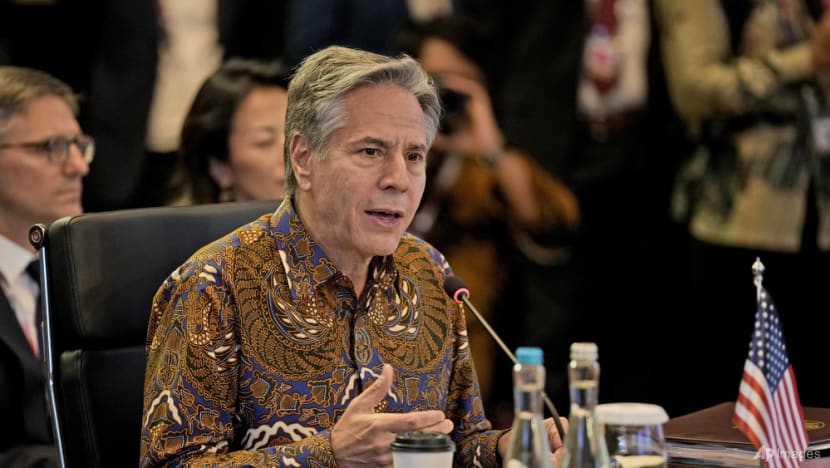US, ASEAN must press Myanmar military regime to stop violence: Blinken

JAKARTA: The United States and the Association of Southeast Asian Nations (ASEAN) must press Myanmar’s military regime to end violence, said US Secretary of State Antony Blinken on Friday (Jul 14).
"In Myanmar, we must press the military regime to stop the violence, to implement ASEAN's Five Point Consensus, (and) to support a return to democratic governance," he said.
Mr Blinken was in Jakarta to attend several meetings with ASEAN foreign ministers as the group held its annual meeting in Indonesia’s capital Jakarta.
Indonesia is the current rotating chair of ASEAN.
Mr Blinken stressed that the US and ASEAN must press for the implementation of the Five Point Consensus, which ASEAN leaders adopted in April 2021 to end the violence in Myanmar.
Earlier on Thursday, ASEAN’s foreign ministers reaffirmed their position that the Five-Point Consensus remains their main reference to address the ongoing political crisis in Myanmar.
What is the Five-Point Consensus?
During a meeting in April 2021, all ASEAN leaders reached a consensus about the situation in Myanmar.
The five points are:
First, there shall be immediate cessation of violence in Myanmar and all parties shall exercise utmost restraint.
Second, constructive dialogue among all parties concerned shall commence to seek a peaceful solution in the interests of the people.
Third, a special envoy of the ASEAN chair shall facilitate mediation of the dialogue process, with the assistance of the secretary-general of ASEAN.
Fourth, ASEAN shall provide humanitarian assistance through the AHA Centre.
Fifth, the special envoy and delegation shall visit Myanmar to meet with all parties concerned.
Mr Blinken also said that the US would release over US$74 million in additional humanitarian releases to the region, including nearly US$61 million to support the Rohingyas who are displaced by the ongoing violence in Myanmar.
According to the United Nations, since Myanmar’s military seized power in a coup in early 2021 against the elected government of Nobel laureate Aung San Suu Kyi, more than 1.4 million people have been internally displaced.
Mr Blinken on Friday also said that the US and ASEAN must push for lasting peace in Ukraine as the war violates the principles of the United Nations Charter.
“It is harming not only Ukrainians but people across this region and around the world by exacerbating the food and energy crisis,” he said.
Mr Blinken said the relationship between the US and ASEAN is at the heart of its engagement in the Indo-Pacific. He added that the two “share a vision of a free, open, prosperous, secure, connected and resilient region”.
“What does that mean? That means a region where countries are free to choose their own path and their own partners, where problems are dealt with openly, not through coercion, where rules are reached transparently and applied fairly,” he said.
REGION OF POTENTIAL FLASHPOINTS
Mr Blinken also took the opportunity to address other issues, such as tensions in the South and East China Seas and North Korea’s latest nuclear test.
"We must uphold the freedom of navigation in the South and East China Seas and maintain peace and stability across the Taiwan Strait."
Tensions between the US and its rival China have risen lately following clashes in the East China Sea between Beijing and Taiwan.
Meanwhile, the South China Sea is also hotly contested as China claims most parts of it, along with ASEAN members Brunei, Malaysia, the Philippines and Vietnam.
ASEAN’s foreign ministers and China’s top diplomat also met in Jakarta a day earlier, where they agreed on guidelines to accelerate the negotiations of South China Sea’s code of conduct.
Later on Friday, Indonesia’s Minister of Foreign Affairs Retno Marsudi said sharpening rivalry continues to define the region.
She made the remarks during the 30th opening session of ASEAN’s Regional Forum (ARF), which focuses on security issues. The ARF consists of 27 countries and includes the US, China and Russia.
“Our region also hosts numerous potential flashpoints. This challenge is becoming more complicated with the evolving non-traditional security challenges such as terrorism, trafficking in-person and maritime piracy,” said Mdm Marsudi.
“We must turn trust deficit into strategic trust by continuing to promote norms of self-restraint and the non-use of force.”
















